Infighting erupts within Pakistan opposition over mining bill seen as ‘threat to provincial autonomy’
PTI faces internal revolt as KP mining bill draws fire over SIFC’s role, foreign consultants’ involvement

Kamran Ali
Correspondent Nukta
Kamran Ali, a seasoned journalist from Khyber Pakhtunkhwa, Pakistan, has a decade of experience covering terrorism, human rights, politics, economy, climate change, culture, and sports. With an MS in Media Studies, he has worked across print, radio, TV, and digital media, producing investigative reports and co-hosting shows that highlight critical issues.

Advocate Akhtar Ali Shah, chairman of the Good Governance Forum, says the bill’s language is vague and dangerous.
Shutterstock
A controversial mining bill has triggered a political firestorm in Pakistan’s Khyber Pakhtunkhwa province, exposing rifts within the ruling Pakistan Tehreek-e-Insaf (PTI) and drawing sharp criticism from opposition parties and industry stakeholders.
The 139-page Khyber Pakhtunkhwa Mines and Minerals Bill 2025 was introduced in the provincial assembly on April 4 after receiving cabinet approval.
Designed to regulate exploration, development, and investment in KP’s mineral sector, the draft legislation has instead ignited debate over alleged federal overreach, the role of the military-led Special Investment Facilitation Council (SIFC), and foreign influence.
PTI members of the provincial assembly voiced strong opposition immediately after the bill’s introduction.
What the bill proposes
The 139-page bill includes 119 clauses and 11 schedules. It proposes sweeping changes:
- Creation of the Minerals Investment Facilitation Authority (MIFA) under the provincial minerals minister.
- A 10-member Licensing Authority, headed by the director general of minerals.
- Establishment of a uniformed Mines and Minerals Force empowered to halt illegal operations.
- Introduction of a mining cadaster system, testing labs, liaison committee, and appellate tribunal.
Clause 19 outlines MIFA’s structure, which includes ministers from key departments, provincial and federal officials, and a representative of mine owners.
Schedule X authorizes force stations and official uniforms for mining enforcement personnel.
Minerals are categorized into 10 groups: Construction, Industrial, Precious Gemstones, Semi-precious Gemstones, Precious Metals, Base and Alkali Metals, Energy Minerals, Dimension Stones, Strategic Minerals, and Rare Earth Elements.
Notably, oil, gas, and nuclear minerals are excluded from the bill’s scope.
PTI’s concerns
Former minister Shakeel Khan questioned the legality of SIFC, which features prominently in the bill’s framework. “If the SIFC is unconstitutional, how can we hand over our resources to it?” he asked. “This is a ploy to seize our mineral wealth.”
Fazal Elahi, another PTI lawmaker, likened the bill to a “drone attack” on the province’s resources and said it was pushed through under emergency procedures.
“It was rushed through the cabinet in the dead of night,” he said. “It must be withdrawn immediately.”
Aurangzeb, also of PTI, warned that vague definitions of “strategic minerals” could later be used to hand over control of valuable resources to SIFC.
“This bill gives too much power to a military-led body,” he said. “I oppose it and will not vote in its favor.”
Sources within the PTI said senior leader Atif Khan also criticized the bill, urging lawmakers via a WhatsApp group to reject it. Chief Minister Ali Amin Gandapur reportedly lashed out at Khan, saying, “Have you even read the bill? If English is a problem, I can send you the Urdu version.”
Aleema Khan, the sister of PTI founder Imran Khan, also called for the bill to be paused until the party’s founder could review it from prison.
Opposition parties call bill unconstitutional
Opposition parties across the political spectrum have also rejected the legislation. Awami National Party (ANP) provincial chief Mian Iftikhar Hussain called the bill unconstitutional and alleged it was prepared by U.S. consultants without consulting local stakeholders.
“It undermines the 18th Amendment and paves the way for federal and foreign control,” he said.
Hussain also claimed the bill was linked to political bargaining, including possible deals for the release of Imran Khan.
Pakistan Peoples Party (PPP) provincial president Syed Muhammad Ali Bacha called the bill a direct attack on provincial autonomy and accused the PTI of hypocrisy.
“They demand provincial rights in Islamabad but surrender them in Peshawar,” he told Nukta, adding that the PPP would resist the bill both in the assembly and through public mobilization.
Industry groups join in opposition
Industry stakeholders have also rejected the bill. Mineral Association President Muhammad Afser said CM Gandapur previously assured that the bill would not be tabled without addressing concerns, but no revisions were made.
“The 2017 Act was more aligned with local needs,” he said. “This bill reflects colonialism and slavery.”
Afser raised alarms over several clauses in the bill, expressing concern about their potential implications. He said that Clause 116 bars legal action against decisions made by licensing authorities, while Clause 25 grants broad immunity to officials acting in “good faith”.
“Clause 119(f) mandates that pending court cases be reviewed under the new law, potentially affecting ongoing legal proceedings.”
Additionally, he added, Clause 19(3) allows the chairperson to appoint co-opted members without outlining clear criteria, raising questions about transparency and accountability.
He said these provisions would undermine judicial oversight and erode public accountability.
Legal experts warn of federal overreach
Advocate Akhtar Ali Shah, chairman of the Good Governance Forum, stated that the bill’s language is vague and potentially dangerous.
He flagged Clause 2(jjjj) for giving federal authorities discretion over which minerals are deemed “strategic”, allowing them to bypass provincial jurisdiction. He also criticized the exclusion of nuclear minerals from the bill’s definition.
“This ambiguity could lead to federal encroachment,” Shah warned.
A senior government official, speaking to Nukta anonymously, noted Clause 2(kk) would require old mining leaseholders to enter joint ventures with the government on terms dictated by the state.
“This is essentially a forced takeover,” the official said.
He also pointed to Clause 10, which compels the KP Licensing Authority to follow directives from the Federal Mineral Wing—potentially nullifying provincial discretion.
Bill’s financial controls raise alarms
The bill also ties KP’s financial decisions to federal recommendations.
Clause 2(1) (f, g, h, k) binds the Minerals Investment Facilitation Authority (MIFA) to follow federal advice on setting royalties, auction reserve prices, fees, and other revenue mechanisms.
“This strips the province of financial autonomy,” the official added.
Government defends legislation
Special Assistant to CM Sohail Afridi acknowledged public distrust of the SIFC but said concerns had been addressed before the cabinet approved the bill.
“Wherever the name of SIFC appears, it draws criticism,” Afridi admitted. “But we clarified the term ‘strategic minerals.’”
Chief Minister Gandapur dismissed the backlash as politically motivated. “Nowhere does the bill transfer authority to the federation,” he said. “A mafia is spreading disinformation out of personal animosity.”
Gandapur claimed the bill would eliminate illegal mining, which he said has historically deprived the province of billions in revenue.
“Since cracking down on illegal sites, we’ve earned PKR 5 billion,” he said. “This bill will boost employment and transparency.”
‘Bill to move only with Khan’s approval’
PTI Central Secretary Information Sheikh Waqas Akram said the controversy prompted a party committee meeting, during which Gandapur briefed leaders on the bill.
“The committee found no clause that compromises autonomy,” he said. “But the bill will only proceed after Imran Khan’s explicit approval.”
In response to the backlash, the KP Assembly Secretariat issued a notification inviting all members to a formal briefing. “The Minerals Development Department has arranged a briefing at the Jirga Hall,” the notice said. “All members are advised to attend.”
PTI Information Secretary Adeel Iqbal downplayed the infighting. “Such debates are normal and part of democratic discussion,” he said.
Adviser on Information Barrister Muhammad Ali Saif emphasized that the bill is part of PTI’s broader reform agenda and would undergo legislative scrutiny. “We will not bow to pressure from interest groups,” he said.
Multiple stakeholders also alleged that American consultants helped draft the bill.
While the U.S. Consulate was contacted for comment, no response was received by the time of publication.







Comments
See what people are discussing